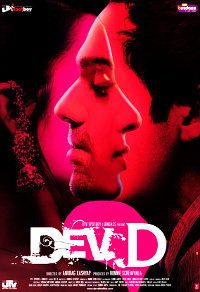I laughed till it hurt and then some more.
The movie is all entertainment. There is no deeper message, no underlying moral - just plain all out entertainment. But that's why I go to the movies, to laugh, not to see a poignant portrayal of urban india (even about its lack of hygiene or its lack of running water). Totaly worth everything I paid for, despite the fact that Lido chose to charge me extra because they don't have an intermission to fleece me with overpriced junk.
Now, there's nothing new about the plot or the premise. Let's get that out of the way - I saw this movie before in 1992 when it was called Mimics Parade. But for anyone who's seen a Priyadarshan re-warmed-over movie, this movie wasn't stolen. This was reborn afresh, just like an idea whose time had come, yet again.
This is a director's movie. This is a script writer's movie more than adequately carried by the actors. The presentation is absolutely original and so is its framing sequence in 2011's Delhi. Whoever though up the name "Suntara" needs a pat-on-the-back (same for the "Mill on the Floss" reference). All in all, they've managed to turn what was probably a shitty (*sic*) joke into a running gag throughout the movie.
And then they went crazy with the idea. Guns, car chases and robberies. Every tiny coincidence, probable as it may be, building up to ridiculous proportions. Like a Coupling episode, but with more fart jokes. As a metaphor for the whole movie there's the bad guys with a paper bag over Shenaz Treasurywalla's head - in short, all the good stuff, with all the bad stuff papered over. Entertaining and full of laughs, without any of stuff that made romantic comedies unbearable.
And the songs aren't half bad either.
--"Our comedies are not to be laughed at."
-- Samuel Goldwyn
Avatar is Pocahontas set in Fern Gully, except with Smurfs who are Thundercats. And hero's plugged in from somewhere, with a smattering of a messiah complex thrown in (and a pity, they'll never make any sequels ... *ssh*).
But now that I've got the cliched bits out of the way, let me rave about the visual beauty of the movie. The reason this movie takes so much flak about the plot is that the CG does not jarr the suspension of disbelief required. To watch Neytri wail and definitely do the damsel in distress routine does bypass the fact that she's a giant cat-alien, into my emotional awareness. Somehow that disrupts the dehumanization of the enemies that the Colonel is under (if he had a cigar on him, I'd have had Quake3 flashbacks). The fight sequences are hardly overdone and they haven't gone bullet-time or john woo freeze-frames on it. Perhaps the brain-stem connections all animals share is probably the only thing that really stretches the imagination. But the movie goes to great lengths to illustrate that it's not really a form of direct control. There's hardly anything wrong with the movie as such - as long as you're only watching it.
There's EPIC FAIL and some glimmers of brilliance in the fauna of Pandora. Most of the animals on the planet have six limbs. This is perfectly acceptable, but if only they'd kept it consistent and extended it to the Na'avi. A bipedal/tetrapod Na'avi co-existing in parallel with hexapodal large animals sort of suggests a really un-bottlenecked evolutionary history (think of the Cambrian explosion, followed by millenia without an extinction event). Which would almost make the nerve fibre connections into a miraculous act of convergent evolution. But not all of it is bad. The lung openings on the direhorses, on their chests with a large volume intake, would've been a brilliant evolutionary jump away from a narrow trachea and probably an easier jump from book lungs & gills. Somehow the fauna is vaguely reminiscent of Nemo Ramjet's Snaiad universe. Last but not least, Turok - the flying giant in butterfly colours. I just can't get over the fact that its name is "last shadow" and the import of that.
All in all, it's a mish-mash of the noble savage, the greed of man (ah, Rousseau vs Hobbes), the modern industrial military complex and an imperfect romance. The movie is watchable, though not by any means an instant classic.
--If you want a happy ending, that depends, of course, on where you stop your story.
-- Orson Welles
Inglourious Basterds. I almost had to be dragged to this movie. I'd like to thank that person before I actually put down anything here.
Now, I'm not a big fan of gore. I mean, superflous, gratuitous gore that Tarantino has almost made into an art. I'm not against realistic, in-context gore, but the sauce and ketchup show that was the restaurant scene in Kill Bill is exactly the kind of scene I never want to see again. I shouldn't have worried about that. I really shouldn't have, because I was in for a treat.
Tarantino had it spot-on with the Basterds. For what, from a quick glance, promises to be a jewish cowboy Western mashed into a World War II universe, the movie really revolves round the brilliant performances of two characters. It turns into a drama of unexpected events and odd coincidences, instead of the grit & gumption of the war hero. The script really winds around them and are perhaps the most real characters I've ever encountered in a Tarantino movie. So, move over Brad Pitt and the rest of the Basterds off the posters and let Shoshanna & Landa take their well deserved privileges. They're the real deal. It's their movie.
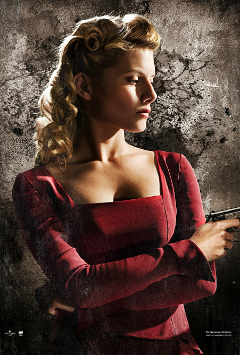
Shoshanna. I'm undeniably smitten by this woman. She is not a woman of violence, but neither is she driven to it. Violence lay in her path and she accepted it within herself. Her character is beautifully portrayed as woman whose war walked in through her front door & sat down to watch a movie. As the unwittingly chosen angel of death, she brings vengence back into style! Played by the lovely Melanie Laurent, her eyes speaking better than her words, Shoshanna comes to life right before our eyes. And dies.
But without a Hans Landa, there wouldn't be a Shoshanna. The multi-lingual SS officer is probably the key character to the entire plotline. The first few minutes of the movie are entirely his. But as the movie rolls on, it becomes clear that what he does is just what his job is. He is portrayed as a man who is given a dirty job because he's the best at what he does. By no means is he a positive character and eventually painted as a traitor, but he's not a demon posessed with a single-minded quest. Indeed, the way he deals with von Hammersmark, is frightening at a level beyond the impending violence. He's an intelligent opportunist on the wrong side of the line. And he plays that role with a smile and straight faced perfection.
The attention paid to details in the movie is amazing. The German three fingers versus the british three, the fancy shoe left behind, the autograph with the kiss and even the intial scenes where the conversation in French & English is intended to lull the hiding children into a false sense of security. Though I'm not quite happy with the way Hitler has been portrayed, he can be demonized without making him a comical misfit.
But perhaps, just perhaps the movie should've ended with Shoshanna's message and her laugh echoing through the flaming wreckage.
--In a war of ideas, it is people who get killed.
-- Stanislaw Jerzy Lec
We are haunted by our mistakes.
Our successes, they will leave us while we're dulled by that afterglow of satisfaction. Your mistakes, however - they follow you around, as you drag your feet through the journey of your life. Like a shadow in the darkness, but their footfalls ever so muffled for you to suspect your sanity. They linger on, to provide that tinge of regret, which unfortunately is the mark of a life lived, instead of slept through.
As I headed out to watch Dev D for a second time, I wasn't expecting to feel any different from what I felt the first time. But I was to be surprised at what I felt for the protagonist - the disdain I had felt for him vanished into thin air, to be replaced with a sense of despair if only by empathy. I felt for his dillemma, the internal conflict that is the core of it all. Maybe it's a twist of perspective, but the experience was different.
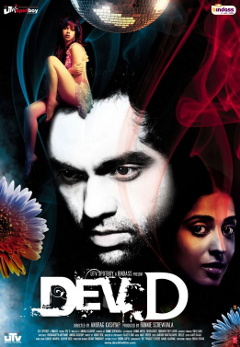
To anyone who's made a mistake, there's an irrational urge to run away from everything that's headed your way - to leave consequences to others and withdraw. That the solution to everything was just to be not there. Not like it hasn't worked before, it just wont work this time - because you didn't wrong someone else, you wronged yourself.
But as you watch Dev and Chanda both go through their lives running away from the consequences of their actions - the realization hits home that you can run, but then that's all you'll ever do in life. Run and run. Run into the arms of drugs, alcohol or any other crutch that could make your mind just stop. Saving you from the monsters that inhabit you, dulling the pain and make you smile, all in ignorance. Anything to stop thinking, stop everything and keep running.
Consequences are strange beasts. They give chase when you run, but wait for you when take your time to walk to them. No one else can make you walk upto your consequences and introduce you to them. The last mile is yours alone to walk. It's not an easy one to walk back, knowing what awaits you at the end. But there comes a point when you're tired of running. When running away is not getting you where you want to be.
There was that moment of epiphany for Dev, standing next to that phone booth picking up the coins. The moment when you realize that this life is just too short to take the long way around. In perhaps what's the most unappreciated twist in the movie, you see the protagonist actually stop and walk back. Back to Delhi, back to Chanda and back to the police station.
On his own feet, to meet his past & make way for his future.
--I have learned silence from the talkative, toleration from the intolerant, and kindness from the unkind;
yet, strange, I am ungrateful to those teachers.
-- Kahlil Gibran
It was always the story of a loser. A loser who lost it all and held onto his sense of loss, because here's the kicker, he's afraid to lose that too. A man who fails to own up to the loss, but keeps it alive, hoping to fill it one day with a replacement. A man so intent on keeping his loss, that what we see of him is a man with a hole where his heart was - wearing it proudly, but in disgust of a world which doesn't care.
What sets him apart from the regular losers of this world is his arrogance, which blinds him. His loss is something the world will never understand, because the world will never understand him. With this utter conviction, he embarks upon a demonstration of his loss - a path of self destruction and deterioration.
The original Devdas was the story of the deterioration of a man in love - unrequited love. A man of the world, taken out of society by himself, unable to rejoin the living in a land of fake love & real affection. A complete loser by any definition but a romantic's. But that's where any comparison to the original story ends.
Perhaps I'm biased. Or perhaps my emotions are lending perspective to the movie that just isn't there for others to draw upon. But I love the movie, the soundtrack, the screenplay and even the casting - half the movie is awesome thanks to Abhay Deol (If I wasn't a fan after Oye Lucky, I'm one, now). I'm not a big fan of Anurag Kashyap - No Smoking looked like the work of someone on some really cheap dope and John Abhraham didn't really help its cause either.
The movie is brilliantly placed in the midst of the day and age of the present. The events picked out from the media of today - the MMS case & the BMW case. The characters instantly recognizable. In fact, you could look at the players and see a little bit of yourself in all of them. The episodes chronicling the arrogance and downfall of Dev can be found in any dive bar in any city in this country - except for the brilliant background score. The events commonplace and the consequences natural - there's no pretension for the sake of the plot, no suspense of disbelief required.
Dev is an arrogant two-faced asshole. He loves no one but himself, but the loss of Paro means more to him than she would have ever meant to him by his side. Every step of the way, we can see a bit of his arrogance being eaten away by the results of it. The inner turmoil of someone who can't understand why Paro cares, but does not love, anymore. A man who's willing to love, but cannot find anyone worthy of such an honour. In fact, someone who's completely lost it - to the point of not remembering what "it" was.
Chanda has also been given a thorough exploration (that she deserves) in the movie, from her origins to the basic humanity of someone in that situation. She's been treated with her history in perspective, to actually lend some substance to a character who's technically a skin-deep style child. Again the casting choice has been excellent, including the accents, the appearance & the fluent tamil diction - all put to use fully in the character portrait.
To go watch that movie, only to notice the drugs, alcohol and prostitution is like looking at the Venus de Milo from the navel down. To me, at least, that was merely a plot device to illustrate the retrogression of Dev. And the soundtrack is simply brilliant - I'm still stuck in a loop between Pardesi, Emotional Atyachar (Rock version) and Nayan Tarse.
The ending is the redemption of the movie and the lead character. The arrogance washed out of him by his experiences, Dev finally arrives at that critical cross-road of life, revisiting his decisions, but without regret - to build a new him out of what's remaining. In a rather inverse-moralistic fashion, the people who gave it all up and tried to find themselves afresh are the ones who have found a measure of happiness. While the pragmatic Paro is stuck in a marriage burdened by an old husband and his other children, Dev & Chanda have actually got a real smile on the final fadeout.
Maybe it's not Happyily Ever After - but is there ever?
--It is better to have loved and lost than just to have lost.
Conflict is the essence of drama. Conflict between people is easy enough to construct - the villain, the hero and the heroine. Put a face on each and the characters play themselves out. Evil shall rule, but it shall be short-lived. Good shall win at the end and order shall be restored.
But occasionally something comes along which distills drama out of nothing but circumstances. No evil, merely ordinary people, their thoughts and cognitive dissonances echoing off each other. That's how I felt at the end of watching Juno.
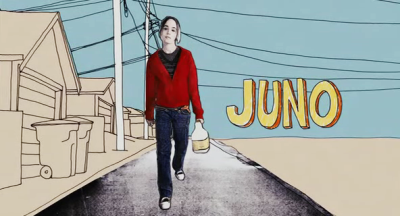
Unlike other movies I write about, I have no spoilers for this one. But the soundtrack haunts me. Definitely something to go back and listen to - not just for the melody, but for the lyrics.
You're such a good friend I haveta break your heart. Tell you that I love you then tear your world apart.
Listen - and hum along ... ~~ you're a part time lover and a full time friend ~~.
--I thought drama was when actors cried.
But drama is when the audience cries.
-- Frank Capra
Futurama, it just won't stay dead.
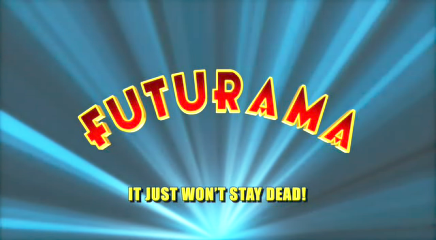
If you're a Futurama fan, you *have* to watch Bender's Big Score. It's a movie made for the hardcore fan, unlike the Simpsons Movie or other carry-overs from tv into the big screen. Read on for the spoilers.
Since Futurama is going to be running on Comedy Central from now on,
they've spent the first four minutes of the movie dissing Fox (oops,
I mean the BOX Network). The FOX BOX executives have been
fired, beaten up, killed and made into a fine pink powder (TORGO'S Executive
Powder), which
appears anywhere where any ingredient is required (*bam*).
The movie does a nice take on the information centric world of ours, with the main villains being the spammers/scammers who manage to take over the world with a nice parody of nigerian 419 spam, popup malware and just plain old lottery scams. Of course, from that point onwards the movie has no real plot at all.
Honestly, the movie is just an attempt to make a happier past for Jurassic Bark. Considering how Nibbler blows his cover, Robot Santa turns good, Bender apologizes to all and the Professor never invents anything - the plot is not following canon for any character (except perhaps Zoidberg).
But the role of Fry fills up into someone who'd sacrifice his own happiness to let Leela be happy. Not typical either, but that's a very touching transformation for someone who's been portrayed as immature for all the episodes.
And not even a can of Slurm to be seen.
But I loved it, nonetheless.
--Fry: Why would a robot need to drink?
Bender: I don't need to drink, I can quit anytime I want.
-- Futurama, "Space Pilot 3000"
It's about a movie and I watched it.
But there's nothing you're going to take away from this movie - whatever you think you took away, you brought it with you when you walked into the theatre.
Just a like a mirror holds no content, the movie too is fairly bereft of a consistent plotline (albeit what's borrowed from Quitters, Inc), but merely reflections of reality appearing and disappearing from a multitude of mirrors.
The camerawork and the general feel of the movie is pretty interesting, (albeit the cabaret song) for a bollywood production, but beyond that the movie has nothing to offer but completely unconnected sequences of plot.
But it is our nature to see patterns where are none, built out of our own biases in perception, in a nonpareil effect. The attempts to make sense out of the confused jumble of thoughts presented results in interesting results indeed.
To make things a lot more blurred than they are right now, let me first touch upon my thoughts - and remember that these are my personal thoughts and not the director's. The movie is about consequences of our actions, as we move through life - the ripples adding up to a tidal wave in the ocean that is life.
The movie starts with the standard caricature of a wannabe rebel yuppie (and smoking is his rebellion) with his socialite wife and their marital issues. Starting from a clear-cut real world scenario, the movie diverges further and further into down-the-rabbit-hole land (even literally) without any perceptible movement out of reality.
Then the social contract is presented and there is no escape. And society steers people with consequences - but here the hidden, mild consequences are merely exaggerated. The basic "How much could one more hurt?" excuse of the habit has been tackled and short-circuited by providing rather harsh penalties indeed. To see someone pass out in a gas chamber full of second-hand smoke is somehow more real than the same happening over a couple of years of constant exposure - somehow the quality of effect alters rather than merely the quantity. And then there's the underline of the paranoia put down by erosion of privacy due to constant surveillance.
To me, the antagonist of the whole sequence is the protagonist himself - not the Baba Bengali or the reality altering effects he seems to have. The struggle between good and evil has been very conveniently left out of the entire script - undergoing a metamorphosis into a mere squabble between your needs and wants. To face himself after realizing the consequences his acts have, learning the lessons from the rough teacher experience is, to be offered the choice again in the end - real life is not so kind (and this was being cruel to be kind).
The basic mode of coercion of an individual to be a building block of a society with rewards and consequences comes out of the seemingly random treatment of the character(s) and the plotline...
The jigsaw puzzle that the movie is perhaps unappealing to a critic who expects a coherent movie. But what you enjoy out of the movie is synthesising the story out of the jigsaw peices you are handed, not analyzing the plot-holes in depth - and that takes effort. The Hindustan times review of the movie was acidly critical and downright mean (and the director failed to show any maturity with a completely Ad Hominem response).
Perhaps you'll find another reviewer talk about this movie as one of individuality or about smoking as peer-induced (Abbas), yet another talking about the religious slants on the concept of the soul & its journey independent from the body's journey (to quote "Athma hai tho shareer ishwar hai, athma nahin hai tho nashwar hai"). And then there'd be the ones who carry an open mind into the movie and carry it rather empty out of it - walk in with your preconceptions & prejudices and you'll find that there's a movie playing.
In short, if you're hoping to be entertained, don't show up till the Bipasha Basu dance sequence :)
--Beauty is eternity gazing at itself in a mirror.
But you are eternity and you are the mirror.
-- Kahlil Gibran
Ratatouille was a funny movie, no doubt. But what set the tone to the hilarity that was to ensue was the Pixar short 'Lifted'. If you've watched Taken & E.T, take five minutes off and watch it on youtube.
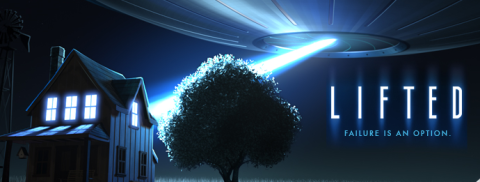
Exquisitely animated, with amazingly clear graphics. the movie is a masterpeice of picture perfect pixels. But the story sort of drags in the middle, after a rather interesting few minutes in the beginning. The whole premise of the movie is somehow flawed at some level, but still it is peppered with a few one liners to remember (like the "what dad doesn't know could fill a few books; And they did, which is why I read them").
Still, the voice of Anton Ego (the food critic) deserves special mention. Somehow it redeems the entire movie by giving it a villain where there really isn't one - Skinner (the short chef) just doesn't cut it. If he had to have a nickname it would be the 'Grim Eater'. Ego's final article about being a critic is a masterpeice in itself.
But this movie doesn't even compare to Monster's Inc, Finding Nemo or Toy Story and has a more forgettable Disney quality rather than pure Pixar magic. Still, there are moments to remember - though maybe not a full movie.
--Being a food critic is all about dishing it out - literally
Some movies are so bad they're good. And there are none which explore this area of beyond-badness than the highschool movies. But the average highschool movie has become a complet cliche. I mean, if you've seen one you've seen 'em all. And if you've seen 'em all, you need to pick up Not Another Teen Movie. And once in a while a movie comes out which falls slightly further from the tree, I think that's SuperBad this year.
Characters: The movie sticks to my favourite combination of characters - the befuddled hero, self-confident heroine, weirdo side-kick and a couple of reverse stereotypes. The very same mix which makes me love H2G2 (Arthur, Trillian, Ford, Zaphod & Marvin), Coupling (Steve, Susan, Jeff, Patrick & Jane) or even Futurama (Fry, Leela, Bender, Prof. Farnsworth & Zoidberg).
In fact Michael Cera plays the befuddled teenager (Evan) to a T. The co-dependent pairing with Seth and the complicated issues around their separation for college brings in some funny dialogues, especially towards the end. Their chemistry is paired into the two girls they are chasing (mm... Becca). Now, add two cops spouting Star Trek & Star Wars one liners. and a nerd pretending to be 25 year old McLovin. But of all the caricatures in the movie, the the cops came out of it more real than anyone else when he says "When I was your age, I hated cops too".
Combine them all up and you've got all the laughs you want. Mindless though it is at the surface, somehow the dillemmas of Evan sprinkles a non-preachy moral editorial in between the laughs. Even the ending seemed appropriate, almost coincidental, yet not final in any way.
Watch the trailer, you just might McLuv it.
--Where humor is concerned there are no standards -- no one can say what is good or bad, although you can be sure that everyone will.
-- John Kenneth Galbraith
There are some movies so cool that they can exist only as trailers. While trawling the depths of the internets, I ran into a bunch of them - well collected & catalogued. Here are a few interesting clips from collegehumor.com.
First up is an epic tale of a young man's struggle against the burdens of his conscience. Of someone who's entire life is about not getting blown up. Experience the safety of being a minesweeper, with all the danger of playing it on your own computer in - The Minesweeper Movie.
If you are more into crime thrillers, rather than the war kind, you might enjoy Facebook / Off. An excellent combination of the classic Face/Off with online identity theft. As you might have guessed, this won't end well.
And for those of us who grew up playing "Where in the World is Carmen Santiago?" (smuggled into school on multiple floppies), here's a Quentin Tarantino-esque adaptation, aptly titled Where the F*ck is Carmen Santiago. After all, you'd have a tough time finding out even with the help of google maps.
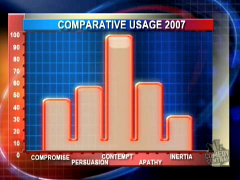
Well, this statistical anomaly is from the Daily Show, as presented by the special correspondent Aasif Mandvi. Somewhat in the same lines as most environmental conservation ads - hopefully the comedy central web-player works for you. It didn't for me - but I found a workable workaround (so to speak).
Apparently, youtube isn't the only place to waste time on the intarweb.
--The human race has one really effective weapon, and that is laughter.
-- Mark Twain
There's no way to satisfy a Simpsons fan. I mean, for a tv show which has technically reached the age of consent ? I didn't think so and I was right. But before anyone can say "Worst. Simpsons. Ever", I have to say that the movie does cater to the average movie goer. I mean, it is no coincidence that the movie begins with Homer asking "Why would anyone pay to see something they could watch on TV for free ?".
Because they make me laugh, that's why. Actually, I started laughing way before the movie began. As I sat through the previews of movies, there was one uber hilarious preview - Balls of Fury. Well, imagine a table tennis deathmatch ala Bloodsport, but with a straight-faced Christopher Walken (well, watch that trailer). Anyway, onto the Simpsons movie spoilers we go.
The movie opens up pretty decently with enough straight up gags. The Green Day concert accident, their funeral being held with American Idiot played on a church organ. But some of those were repetitive. Lisa and the cute environmentalist kid, for instance (anyone remember the "Dirt First" episode?). Or the Bart nude on a skateboard which was faintly reminiscent of the Austin Powers movies, except the part where he goes through the hedge and there's a glimpse of his ... y'know. And well, you *have* to hear "Spider Pig" to find it hilarious.
Then there's the environmentalists, except instead of being green peace style sabotage - there's real authority in the shape of EPA. The moment I heard the voice of the EPA chief Russ Cargil, I already knew they were the villains - they could've gotten a new voice instead of reminding me of Hank Scorpio. And he goes mad with power, as he himself says - "Yes, I'm mad with power. Have you ever seen someone go mad without power ? It's boring."
They seal off Springfield in a transparent dome to prevent the pollution from leaking (Marge knits "Dome, Sweet Dome"). And Kent Brockman calling it the "Trappuchino" (cue a starbucks cup with a transparent cover). And then they find that Homer is responsible for the last sludge tank which brings out a whole lynch mob for the Simpson family. And we see Homer go back to being a jerkass as he escapes through the sinkhole in maggie's sandbox.
And then they move to Alaska - but without the cliched "The Simpsons are going to _____" (Marge re-knits "Nome, sweet Nome"). Still, the Alaska sequence was perhaps the most funny part of the movie. A Disney movie parody of Snow White, Bambi and Cindrella - except, they're in a bedroom helping Homer & Marge get undressed. And Homer saying "I'm staying in Alaska, nothing can make me go back to America".
Eventually, we have Cargill talking about the "new" Grand Canyon between Shelbyville and Capitol City. Marge realizes that they are going to destroy Springfield, but Homer doesn't want to help the town. They split up and we have Homer trying to save his family.
But it had to have a happy ending, right ? And the movie closes with Maggie saying her second ever (heh) word - sequel and a La Marseillaise parody for the credits.
But to the fan inside me, there were some things glaringly missing. I mean, two hours of a movie and the only one getting drunk is Bart ? Where is Moe's Tavern, Barney or Homer hanging out with Lenny/Carl ? Flanders is a cool normal person, rather than being a complete example of square-hood. There's no Apu at all and I don't know why we didn't get to see Patty & Selma blame it all on Homer. On the other hand, there's Lisa knocking out Bart, which has never happened so far in the series either. And instead of Rainer Wolfcastle we have Ahnold Schwarzenegger, who was elected to lead & not to read.
But where are the flourishes of George Meyer or John Schwartzwelder ? If I wanted to draw parallels, compare an average Southpark episode with the movie itself to get an idea of how to drag three storylines together into a two hour movie - with the odd song thrown in. The Simpsons movie, as funny as the scattered gags were, hardly has anything which makes me really want to watch it again.
Memorable or not, it was funny while it lasted.
--Oh, well, of course, everything looks bad if you remember it.
-- Homer Simpson ("El Viaje Misterioso de Nuestro Homer")
I wouldn't have paid to watch this movie. Instead of the dark, deep conflict between power and losing control, the movie is peppered with a self-obsessed Peter Parker and a depressed MJ. Neither of which are wrong or bad, but the emotional drama is also not used to any effect.
No Villains: Topher Grace is the only saving grace in the whole movie. His transformation into Venom gives a decent bad guy. The sandman puts me to sleep and Harry flips-flops in & out of villainhood. The small tugs & pulls of conflict in the former was brought out in the wrong light - less of dark desperation than I'd imagine.
The scenes looked peiced together from clips inspired from movies. The comedy just didn't fit in and neither did the cool Peter Parker doing a Saturday Night Fever sequence down the boulevard. And the tower spire with the dark spiderman on top looked nearly identical to the scenes from Underworld, including the jump off the top. It attempts to do a fair bit of moralizing, but the message falls far short of the original With great power comes great responsibility, even after they got Stan Lee to say it ("I guess one *Superhero* can make a difference.", 'nuff said). But there is one quote off the movie which I'm still going to take to heart.
Aunt May: You start by doing the hardest thing: you forgive yourself.
All in all, I think I forgive myself for wasting those hours of my life.
--Children begin by loving their parents.
After a time they judge them.
Rarely, if ever, do they forgive them.
-- Oscar Wilde
While on my way back from Sydney on Singapore airlines, I ran out of things to do. Now, rather than play Mario on their onboard entertainment, I took a look at their comedy section. That's how I saw my first episode of Futurama - Roswell that ends well. And I was a fan in a few minutes. Thanks to set of borrowed DVDs, I've finished watching every single episode - yup, all 72 of them. I love the series for the the very same reasons I love the other Matt Groening creation - the Simpsons. The referential coherence of both series shows a nearly impossible amount of research put into the script and story line.
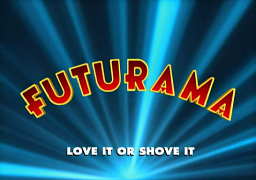
Good News, Everyone: Just like every other good cartoon, the jokes are at every level of the series - the characters, situations and even tag lines. In fact, the whole plotline is one giant inside joke about how things change, yet stay the same. For instance, Fry who was a delivery boy in the year 1999, ends up as a delivery boy in the year 3000 - except the deliveries are now to far-off planets, rather than to city blocks.
The Characters: The character set for the show is literally identical to my standard comedy situation. A befuddled hero, a self-confident heroine, one weirdo side-kick and then a couple of total reverse stereotypes. This is literally identical to say, h2g2 (Arthur, Trillian, Zaphod) or Coupling (Steve, Susan, Jeff) - we find Fry, Leela and Bender in each of those slots. Of course, Futurama would be a non-starter without Bender (aka Bender Bending Rodríguez). Rather than being a logical minded machine, he's the ultimate personification of the human vices - drinking, smoking, swearing, gambling, stealing ... in short, the whole deal. Or take the professor for instance, who is actually Fry's nephew by a long way, but is older than Fry. Even Dr Zoidberg, who sounds like a Jewish doctor but is not a doctor (heh, the intro sequence is amazing) and of course, a shellfish (i.e not Kosher). Even Leela, whose one eye gives her no depth perception which is actually essential to flying an aircraft. Add a rich intern, a rastafarian accountant, a shatner clone in short underpants, a robot devil (Beezelbot), a killer Santa - stop laughing !
Cultural Leakages: Bender's "bite my shiny metal ass" has moved out the world of cartoons into being a real cult phrase. For instance, if you do a reverse dns lookup of the pirate bay servers you'll get bite.my.shiny.metal.ass in the domain name. I occasionally run into even more obscure Futurama references such as "What ? My mother was a saint !" in response to utter gibberish. Even the "Why worry about this planet ? It's not like this is the only one we got" makes me smile, although wryly.
Episodes: If I had to pick a couple of favourite episodes. I'd definitely pick Spanish Fry as the one I liked best. The concept of poaching humans for their human horn truly draws parallels to the african rhino situation. The Godfellas episode is also thought provoking - especially the last few minutes. And the section about greenhouse effect in the Crimes of the Hot truly belongs in an educational film - especially the silencing of the questioning child. There are touching episodes as well, like The Sting or The Luck of the Fryrish - both of which have heart-tugging endings.
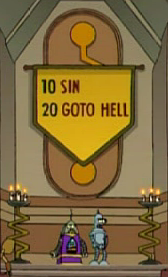
Language: Every good Sci-Fi sequence requires its own language. Futurama doesn't just stop at using new words like Blernsball or Slurm, but also goes onto redefine some old words like XMas which is pronounced as it is written and nobody remembers the Christ part of it. They even went further to invent a whole new alphabet to put alien messages in. Here's how it actually looks - I wonder if I can get a t-shirt printed (but nobody except Futurama fans will get it).
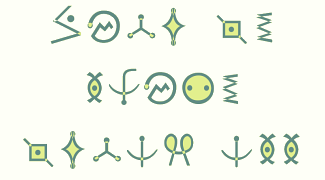
All in all, a thoroughly enjoyable but pleasantly thought-provoking animated series for educated adults.
--You can't go faster than the speed of light.
That's why scientists increased the speed of light in 2208.
-- Futurama, A Clone of My Own
You can't keep a rain-forest in your backyard, but sometimes a tape of David Attenborough's productions will serve as a sufficient substitute. Not only did he produce groundbreaking nature documentaries, but he assembled an amazing team who were equally passionate about the unrivaled beauty of nature. The Bristol division of BBC turned out a series of expensive nature documentaries which were setting a standard in the field.
My attraction to his particular brand of nature documentaries come from the frequent change of scenery. Where most of the "modern" documentaries reserve an entire half-hour to a particular location or activity, Attenborough documentaries generally travel across the world in the hour. Also the documentaries hardly have any people and does not track people as characters in the story being played out. I am pretty sure they could've made a few more hours of documentaries with the reels they cut out per hour.
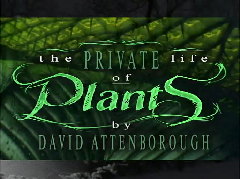
Private Life of Plants is my favorite series by David Attenborough. Now, Blue Planet and other works have taken me far, wide and deep throughout the biosphere. But those leave me with a distant yearning to see for myself these wonders of the world - Christmas Island while the crabs migrate, Palau to see the jellyfish swarms, Fjords of Norway where the whales sound, Great Barrier Reef when the corals are spawning. Deep in my heart, I know that I'll probably die before I see these desires fulfilled. Private Life of Plants, on the other hand takes me somewhere which doesn't exist - the world of plants where months seem to pass in minutes and in 30 seconds we've moved from a frigid winter to a warm spring, through the thaws and amidst the flowers that declare the arrival of spring.


That by itself may seem like a magical trip across time. But there's magic even in the simple things. The background music for instance is very appropriate and literally blends into the actions on screen, as if they had been scripted to the music. There are visits to the inaccessible islands in the pacific, which are preceded by the aerial views of them which add to the environmental setup for some exotic flowers. Even something as simple as a himalayan balsam seed falling into the nearby water is dramatic and accentuated by the plink of the drop, pulled into focus in slow motion.


Amidst all these scenery switches, there are no pictures of an elderly (well, in his early forties) English gentleman lugging his luggage, sweating it out in a 4x4 jeep (no Steve Ervin, he is). Even when we rarely see him, it is merely to emphasize the extremity of the environment and how exactly we (or he) just don't fit in.


But as I said earlier, the truly remarkable thing is its fast forwarded view of the plant world, documenting the fights, battles and conquests of these outwardly immobile flora. There is beauty in a flower opening, blackberries ripening and a mushroom slowly poking its head through the dead leaves. There is nothing beyond just sitting and watching wind hit a dandelion patch. Watching and wondering, you couldn't get tired of the magic on screen.
This is the ultimate documentary. *THE* Ultimate.
--Art is Nature speeded up and God slowed down.
-- Chazal
Most people actually kid around when they say that I shall watch your career with interest. But ever since I watched Coupling, I've sort of peeked around for overflow of the cast into other shows. The latest among those is NBC's Teachers. This has our very own Susan (Sarah Alexander) in it and even more interestingly she seems to be dressed to please :)

This bears watching ... quite close watching indeed. Somebody watch this and tell me if it's any good :)
--Time is a great teacher, but unfortunately it kills all its pupils.

